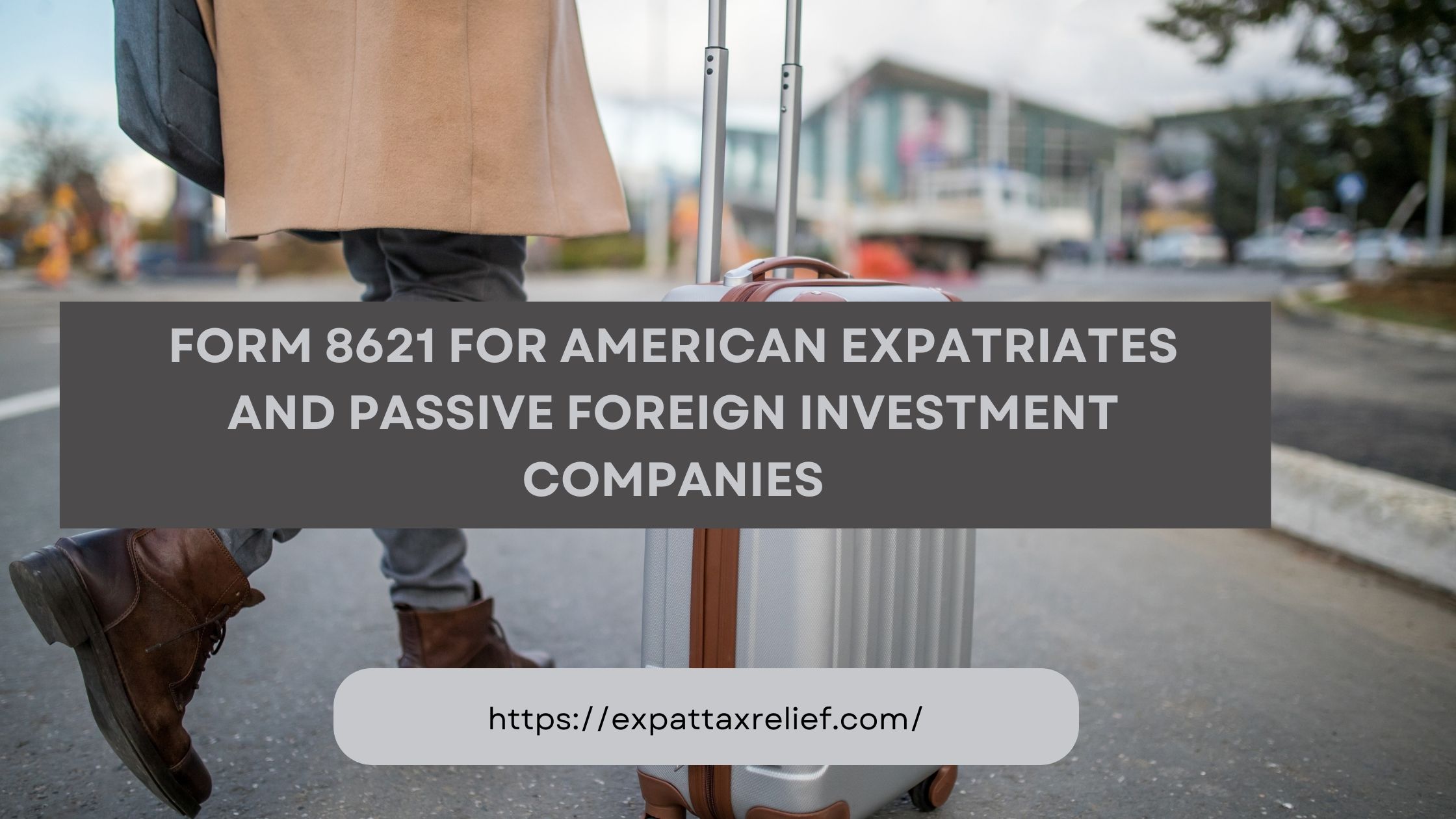For American expatriates, it’s important to be familiar with the most common income tax forms. For example, Form 2555 (Foreign Earned Income Exclusion) and Form 1116 (Foreign Tax Credit) are both fairly easy to understand. But if you’re an expat with shareholder investments, you may also have to complete disclosure forms that must be filed according to very specific tax rules such as Form 8621.
If you are a shareholder of a company or fund that fits the definition of a Passive Foreign Investment Company (“PFIC”) or Qualified Electing Fund (“QEF”), then you will have to file Form 8621 with your 1040 tax form. This form’s official title gives you information about who files it: “Form 8621 Information Return by a Shareholder of a Passive Foreign Investment Company or Qualified Electing Fund.”
Key Takeaways
- US citizens who have shares in a PFIC are required to file Form 8621 every year.
- Shareholders who are required to report certain types of passive foreign investment company (PFIC) income can use Form 8621.
- Form 8621 is required to be filed by both direct and indirect shareholders.
Do I Need to File IRS Form 8621?
In order to be a PFIC, the corporation must be foreign. “Foreign” refers to entities that were formed in countries other than the United States or its territories. If at least 75% of the corporation’s annual gross income is investment-type income such as interest, dividends, capital gains, royalties and the like then it is a PFIC. A corporation meets the asset test if at least 50% of the average percentage of its assets produce or are held to produce passive income.
So, do I need to file IRS Form 8621?
If you are a direct or indirect shareholder of a PFIC, you are required to file IRS Form 8621 for each year that you:
- Recognize gain on a direct or indirect disposition of PFIC stock, or
- Receive certain direct or indirect distributions from a PFIC, or
- Make an election reportable on Form 8621.
Form 8621 Examples and Exclusions
If you are a direct owner of a PFIC, you must file Form 8621. A mutual fund or custodial account could own shares in a PFIC, making you a direct owner and triggering the requirement to file Form 8621. If your PFIC is also a CFC, this may exempt you from filing Form 8621.
Passive Foreign Investment Companies (PFICs) in a Nutshell
Form 8621, known by the longer name Information Return by a Shareholder of a Passive Foreign Investment Company or Qualified Electing Fund, is required of shareholders of companies or funds that are defined as Passive Foreign Investment Companies or Qualified Electings Funds and that were formed outside of the United States.
Due to loopholes in the tax code, some taxpayers have been using foreign-based mutual funds and startups to avoid paying taxes. Taxpayers who use PFICs are required to report their income on Form 8621 and pay taxes at the highest applicable rates each year.
What Qualifies as a PFIC?
A PFIC is considered a foreign corporation if it meets the criteria of either the income or asset test:
An income test is applied to determine if the corporation is a PFIC. If at least 75% of the corporation’s annual gross income is categorized as investment-type income (interest, dividends, capital gains, royalties, etc.), it is a PFIC.
The Asset Test – A corporation must satisfy the Asset Test to be considered a Passive Foreign Investment Company (PFIC). Under this test, at least 50 percent of the average value of its assets produce or are held for purposes of producing passive income.
Do you meet either of those criteria? If so, know that you’ll need to file Form 8621 annually for each year that:
- You had a gain on a direct or indirect disposition of PFIC stock, or
- You received certain direct or indirect distributions from a PFIC, or
- You made an election reportable on Form 8621
Form 8621 Explained: What Exactly Is Indirect Ownership?
Indirect ownership of a Passive Foreign Investment Company (PFIC) may occur if you are an indirect shareholder of a pass-through entity, such as a partnership or S corporation, that is a direct or indirect shareholder of a PFIC. This indirect ownership may also occur if you are the shareholder of a PFIC that is also a shareholder of another PFIC. Additionally, if you own 50% or more of the stock in a foreign corporation that is not a PFIC and that directly or indirectly owns stock in a PFIC, then you are considered an indirect owner of that PFIC.
How Qualified Electing Funds (QEFs) May Affect Your American Expatriate Tax Rates
Expat investors with shares in PFICs often elect to pay under QEF rules. If you choose to go the QEF route, you’ll need to file a separate Form 8621 for each PFIC in which you have shares. And, you’ll want to gather the number of shares in each stock class owned at the beginning of the year, changes in the number of shares in each class and dates of changes, and the number of shares in each class owned at the end of the year before you file.
Beyond Form 8621 Filing Requirments
In addition to the filing requirements for Form 8621, you may still need to file other forms if you have an ownership interest in a foreign partnership or a foreign LLC. Forms 8865 and 8858 detail the filing requirements for foreign partnerships and foreign LLCs taxed as disregarded entities respectively.

